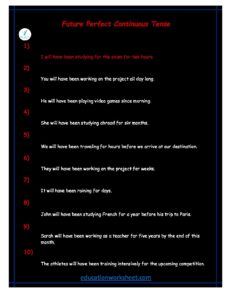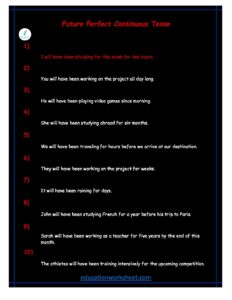how to converting Future Perfect Tense interrogative sentences to positive form
how to converting Future Perfect Tense interrogative sentences to positive form
The Future Perfect Tense is a grammatical construction used in English to express actions that will be completed at some point in the future before another event or time. It is often used to indicate the anticipation of a specific action or state of being occurring before a reference point in the future. Interrogative sentences in the Future Perfect Tense are questions that seek information about such actions or events. Converting these interrogative sentences into positive statements requires a thorough understanding of the tense and the structure involved.
In this extensive guide, we will break down the Future Perfect Tense, discuss interrogative sentences, and provide a comprehensive step-by-step process for converting them into positive statements. By the end, you’ll have a solid grasp of this grammatical concept and be able to easily convert questions into positive sentences in the Future Perfect Tense.
1. Understanding the Future Perfect Tense:

Before we delve into converting interrogative sentences, it’s crucial to grasp the basics of the Future Perfect Tense. The Future Perfect Tense is used to describe an action or state that will be completed in the future before another action or time. It is constructed using the future auxiliary verb “will have” followed by the past participle of the main verb. For example:
- I will have finished my homework by 6 PM.
- They will have left for their vacation by next week.
2. Identifying Interrogative Sentences:

Interrogative sentences, also known as questions, are sentences designed to inquire or seek information. In the context of the Future Perfect Tense, these sentences often begin with an interrogative word (who, what, when, where, why, how, etc.) or an auxiliary verb (will, shall, can, may, etc.). Here are some examples:
- Will you have completed the project by Friday?
- When will they have finished their dinner?
- How will she have prepared for the exam?
3. Steps to Convert Interrogative Sentences to Positive Form:
Converting interrogative sentences in the Future Perfect Tense to positive statements involves the following steps:
Step 1: Identify the main verb and auxiliary verb:
In any sentence, it’s essential to identify the main verb and the auxiliary verb. In Future Perfect Tense, the auxiliary verb is “will have,” and the main verb is the past participle.
Step 2: Rearrange the sentence:
The key to converting interrogative sentences to positive form is to rearrange the words. Move the auxiliary verb (usually “will” or “shall”) to the front of the sentence, and place the subject and main verb afterward. Ensure that you remove the question word.
Step 3: Use a full stop (.) instead of a question mark (?):
Since you are changing a question into a statement, replace the question mark with a full stop.
Step 4: Ensure subject-verb agreement:
Make sure that the subject and verb agree in number and person. If the subject is singular, the verb should be singular; if the subject is plural, the verb should be plural.
Step 5: Add additional information if necessary:
In some cases, you may need to provide additional context to make the statement more informative and complete.
4. Examples of Conversion:
Let’s go through several examples of converting interrogative sentences in the Future Perfect Tense to positive statements:
Original Interrogative Sentence: Will you have completed the project by Friday? Converted Positive Sentence: You will have completed the project by Friday.
Original Interrogative Sentence: When will they have finished their dinner? Converted Positive Sentence: They will have finished their dinner.
Original Interrogative Sentence: How will she have prepared for the exam? Converted Positive Sentence: She will have prepared for the exam.
5. Special Cases and Considerations:
In some cases, converting interrogative sentences to positive form may require additional modifications. Here are some special considerations:
how to converting Future Perfect Tense interrogative sentences to positive form

a. Use of “will” or “shall”:
The use of “will” or “shall” as auxiliary verbs depends on the subject and context. “Will” is more commonly used, but “shall” is used with first-person singular and plural subjects to express a sense of determination or obligation.
Original Interrogative Sentence: Shall we have completed the assignment by tomorrow? Converted Positive Sentence: We shall have completed the assignment by tomorrow.
b. Removing question words:
Ensure that you remove any question words (who, what, when, where, why, how, etc.) from the original interrogative sentence.
Original Interrogative Sentence: When will he have arrived? Converted Positive Sentence: He will have arrived.
c. Subject-Verb Agreement:
Maintain subject-verb agreement in terms of number and person.
Original Interrogative Sentence: Will she have called her friends? Converted Positive Sentence: She will have called her friends.
6. Adding Additional Information:
In some cases, you may need to add more context or information to make the positive statement complete.
Original Interrogative Sentence: Will they have finished the project by the deadline? (with additional information) Converted Positive Sentence: They will have finished the project by the deadline as expected.
7. Practice and Application:
Converting interrogative sentences to positive form in the Future Perfect Tense is a skill that becomes more natural with practice. Try converting various questions into statements and ensure that you understand the tense, subject-verb agreement, and auxiliary verbs.

